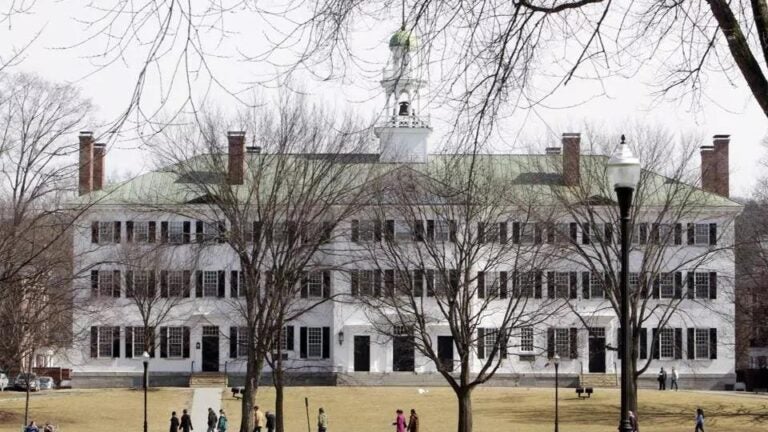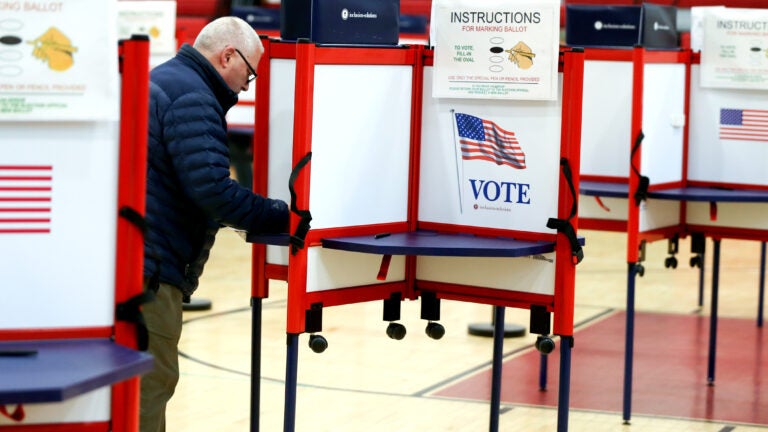Why the Trump administration is moving to ‘disestablish’ a Massachusetts tribe’s reservation
"This is one of the most cruel and nonsensical acts I have seen since coming to Congress."

The Mashpee Wampanoag tribe is pledging to fight a move by President Donald Trump’s administration to “disestablish” its reservation.
Cedric Cromwell, the chairman of the Cape Cod-based tribe, says he was informed Friday at 4 p.m. by the Bureau of Indian Affairs that Department of the Interior Secretary David Bernhardt had ordered their 321-acre reservation be taken out of federal trust, following two court decisions declaring that the federal government didn’t have the authority to give the lands special status.
The tribe, whose ancestors have lived in the region for more than 12,000 years, first gained federal recognition in 2007.
And while the order doesn’t mean that the Mashpee Wampanoag tribe loses that recognition, it would mean that their reservation — split between Mashpee and Tauton — would no longer be considered sovereign land. As the Associated Press reported in 2018, that would mean the tribe would have to shut down its police force and other social services, subject residents to government taxes, and further delay its efforts to build a casino complex in Taunton.
According to the Associated Press, the federal government hasn’t removed a tribe’s land trust status against its will since the mid-20th century’s so-called Termination Era.
The move Friday came after a federal appeals court ruled against the tribe last month, upholding a lower court’s ruling that the Mashpee Wampanoag didn’t qualify to have their land taken into trust because the tribe wasn’t federally recognized in 1934, when the Indian Reorganization Act was passed, creating a process to restore sovereign land rights.
Conner Swanson, a spokesman for the Department of the Interior, told WBUR that the agency was effectively required to revoke the tribe’s reservation status by the appeals court ruling. The department originally accepted the Mashpee Wampanoag’s trust request in 2015.
“This decision does not affect the federal recognition status of the Tribe, only Interior’s statutory authority to accept the land in trust,” Swanson said. “Rescission of the decision will return ownership of the property to the Tribe.”
However, Cromwell called the action “cruel” and “unnecessary” Friday, citing the effects of the coronavirus outbreak, as well as a separate pending legal case involving the status of the trust.
“The Secretary is under no court order to take our land out of trust,” he said in a statement Friday. “He is fully aware that litigation to uphold our status as a tribe eligible for the benefits of the Indian Reorganization Act is ongoing.”
Cromwell added that the order raised the question: “What is driving our federal trustee’s crusade against our reservation?”
Last year, the tribe had tried to get Congress to reaffirm its reservation status, after a legal challenge by opponents of their proposed casino threw it into uncertainty. A bill introduced by Rep. Bill Keating proposed to clarify that the Mashpee Wampanoag was eligible to have its land taken into trust and prevent future legal challenges.
However, after the bill was approved by a House committee and fast-tracked for a floor vote, Trump himself weighed in with a tweet urging Republicans to oppose the somewhat obscure legislation. The Republican president also tied the bill to Sen. Elizabeth Warren, a Democratic presidential primary candidate at the time who had vocally supported the tribe’s efforts to maintain its reservation.
Republicans shouldn’t vote for H.R. 312, a special interest casino Bill, backed by Elizabeth (Pocahontas) Warren. It is unfair and doesn’t treat Native Americans equally!
— Donald J. Trump (@realDonaldTrump) May 8, 2019
While the bill did eventually pass the Democrat-controlled House (with support from almost every Democrat and roughly a quarter of Republican members), it has since stalled in the Republican-controlled Senate.
The only two House Democrats to vote against the legislation were the two members of the Rhode Island delegation, who argued it would unfairly pave the way for the tribe’s Taunton casino that would compete with the two nearby casinos in their state. Work on the $1 billion casino has been halted due to challenges to the Mashpee Wampanoag reservation.
Twin River, the operator of the two Rhode Island casinos, also hired Matthew Schlapp, a conservative activist and vocal Trump supporter, to lobby for the company on the issue of the Mashpee Wampanoag reservation, as The Washington Post reported after Trump spoke out against the bill. Schlapp’s wife, Mercedes Schlapp, was Trump’s strategic communications director at the time. However, Schlapp said his wife played “no role” in his advocacy.
Still, in a series of tweets Saturday afternoon, Keating called Trump’s opposition an “attempt to assist his lobbyist and special interest friends.” The Bourne Democrat called the Department of Interior’s order Friday “one of the most cruel and nonsensical acts I have seen since coming to Congress.”
In a time of national health and economic emergency, the Secretary of the Interior should be reaching out to help all Native American tribes.
— Congressman Bill Keating (@USRepKeating) March 28, 2020
“The Secretary should be ashamed,” he wrote. “In a time of national health and economic emergency, the Secretary of the Interior should be reaching out to help all Native American tribes.”
Keating said his bill — co-sponsored by Rep. Tom Cole, an Oklahoma Republican — would rectify the issue, but noted that it is still awaiting action in the Senate.
Whether or not the casino project is allowed to proceed on tribal lands is also a factor as Massachusetts gaming officials decide whether to permit a third resort casino, which would be located in the southeastern region of the state.
For his part, Cromwell pledged Friday to continue fighting the order to revoke the tribe’s reservation status, regardless of its motives. The tribe is continuing to sue Bernhardt in a separate case, arguing the secretary did not properly consider factual evidence submitted in support of their land trust eligibility. According to the State House News Service, a resolution in the case is not expected until late this year, at the earliest.
“We have survived, we will continue to survive,” Cromwell wrote Friday. “These are our lands, these are the lands of our ancestors, and these will be the lands of our grandchildren. This Administration has come and it will go. But we will be here, always.”
Clarification: This story has been updated to clarify the Mashpee Wampanoag’s history in the region.








Conversation
This discussion has ended. Please join elsewhere on Boston.com